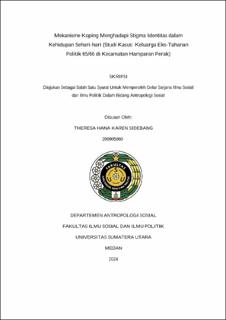| dc.contributor.advisor | Sembiring, Sri Alem Br | |
| dc.contributor.author | Sidebang, Theresa Hana Karen | |
| dc.date.accessioned | 2024-09-27T02:39:34Z | |
| dc.date.available | 2024-09-27T02:39:34Z | |
| dc.date.issued | 2024 | |
| dc.identifier.uri | https://repositori.usu.ac.id/handle/123456789/97789 | |
| dc.description.abstract | This paper examines the coping mechanisms of the families of former political prisoners from the 1965/66 events in facing identity stigma in Hamparan Perak Subdistrict, Deli Serdang Regency. The focus of this study observes coping mechanisms in facing identity stigma from the community and government policies. Each individual has their own coping mechanisms in dealing with identity stigma post-Gestapu events. The coping mechanisms used by the families of former political prisoners involve both concealing and revealing their identities depending on the context, situation, and individual cognition.
This study uses a qualitative method with two months of fieldwork. Data collection techniques include direct observation and in-depth interviews resulting in field notes. Key informants consist of a volunteer from YPKP who provided information and directed the author to relevant members of the families of former political prisoners. This paper is based solely on data from informants who are members of the families of former political prisoners. The views and opinions presented are entirely based on the experiences and information provided by these informants. Additionally, the author uses a literature review to deepen the understanding of the stigmatization experienced by the families of former political prisoners in other parts of Indonesia. The collected data serves as a critical basis for analyzing the impact of identity stigma on the daily lives of the families of former political prisoners in Hamparan Perak Subdistrict.
The results of this study show that coping mechanisms against identity stigma among the families of former political prisoners from 1965/66 involve complex and varying strategies, including careful cognitive assessment, contextual adjustment, and responses to situational changes. The study finds that the coping mechanisms used reflect an understanding of the impact of stigma. Further research is needed to understand the coping mechanisms against identity stigma among the families of former political prisoners from 1965/66, particularly regarding the effects of interventions from various organizations or programs that support them in facing such stigma. | en_US |
| dc.language.iso | id | en_US |
| dc.publisher | Universitas Sumatera Utara | en_US |
| dc.subject | Coping Mechanisms | en_US |
| dc.subject | Stigma | en_US |
| dc.subject | Identity | en_US |
| dc.subject | Former Political Prisoners | en_US |
| dc.subject | Labeling | en_US |
| dc.subject | SDGs | en_US |
| dc.title | Mekanisme Koping Menghadapi Stigma Identitas dalam Kehidupan Sehari-hari (Studi Kasus: Keluarga Eks-Tahanan Politik 65/66 di Kecamatan Hamparan Perak) | en_US |
| dc.title.alternative | Coping Mechanisms Facing Identity Stigma in Daily Life (Case Study: Families of Former Political Prisoners 65/66 in Hamparan Perak Subdistrict) | en_US |
| dc.type | Thesis | en_US |
| dc.identifier.nim | NIM200905060 | |
| dc.identifier.nidn | NIDN0023086902 | |
| dc.identifier.kodeprodi | KODEPRODI82201#Antropologi Sosial | |
| dc.description.pages | 120 Pages | en_US |
| dc.description.type | Skripsi Sarjana | en_US |


